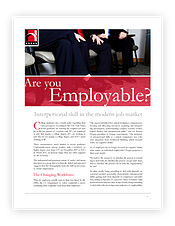 Jerry Seinfeld once remarked that “the only difference between a job interview and a blind date is that there is a slightly higher chance you'll be naked at the end of the date – otherwise, they're not that much different." Indeed, both share a lot in common; two strangers meeting for the first time, trying to figure each other out, trying to see beyond the facade and evaluate the person.
Jerry Seinfeld once remarked that “the only difference between a job interview and a blind date is that there is a slightly higher chance you'll be naked at the end of the date – otherwise, they're not that much different." Indeed, both share a lot in common; two strangers meeting for the first time, trying to figure each other out, trying to see beyond the facade and evaluate the person.
One of my Hogan colleagues just shared an interesting survey of nearly 7,000 organizations in Canada concerning their use of various selection practices. Of the organizations surveyed, 79% use interviews, 10% use a job knowledge test, and only 9% use a personality assessment.
Yet, the traditional job interview is tainted by a number of factors:
• Questions Used – logically, the nature of the questions asked is critical to the reliability and validity of the interview (using job-related, structured interview questions doubles validity).
• Applicant Characteristics – the effect of the interviewer’s personal liking of the applicant has consistently been found to be related to interviewers’ evaluations. ("Wow, he reminds me of Uncle Billy.") Again, it has been shown that this similar-to-me effect is much less pronounced when the interview is structured and job requirements are clear.
• Nonverbal Behaviors – most studies have concluded that nonverbal cues are, in fact, related to evaluations. Eye contact, head movement, smiling, hand movement, and general body posture (rigidity versus movement) are cues that are related to favorable interview decisions.
• Verbal Facility – articulate and verbally-capable individuals can create strong positive impressions, leading to what communications experts call the “halo effect.” Poor or inconsistent articulation can lead to negative summations; just witness the latest debate gaffes, flubs, and lapses of memory from our current crop of presidential wannabes.
• Weighting Information – it has been found that more weight is given to negative information over positive information in the interviewer’s decision, even for experienced interviewers.
One of the big disadvantages of using a typical employment interview is that the interviewees are not given the chance to demonstrate the job-related skills he or she may possess. There is a glaring exception; if the interview context places the interviewee in a situation that mimics the job-related setting, then it is possible to evaluate the interviewee’s ability to handle this kind of job. This can give the interviewer a better idea of whether or not the applicant can truly perform the job.
Up until 1945, National League baseball played with an ugly, unwritten rule of membership: no Black baseball players allowed. That was until Branch Rickey, general manager of the Brooklyn Dodgers, interviewed the great Jackie Robinson for the opportunity to be the first baseball player to break the color barrier in baseball. Rickey closely scrutinized Robinson during their first interview and solemnly warned him of the abuse, ridicule, and scorn he would receive from fans, sportswriters, and even fellow players. If he were not able to take the abuse and insults by not fighting back, then he would fail and set integration of baseball back twenty years.
Robinson listened calmly and pondered Rickey's verbal picture of what life would be like for this pioneering role. Then for five minutes Robinson sat absolutely silent; Robinson thought while Rickey waited. He finally responded that he had full confidence in his ability to play in the National League without incident. Rickey hired him. Rickey was very impressed with Robinson's silent control, his obvious ability in demonstrating he would not be provoked.
So whether you’re preparing for a job interview or blind date, you might heed some advice from Henry Kissinger, who once opened a press conference with this famous line, “I hope you have questions for the answers that I’ve prepared today!”
 College graduates face a harsh reality regarding their career prospects. According to the New York Times, recent graduates are entering the toughest job market in the last quarter of a century; only 56 percent are employed in jobs that require a college degree, 22 percent are working in jobs that do not require a college degree, and 22.4 percent aren't working at all.
College graduates face a harsh reality regarding their career prospects. According to the New York Times, recent graduates are entering the toughest job market in the last quarter of a century; only 56 percent are employed in jobs that require a college degree, 22 percent are working in jobs that do not require a college degree, and 22.4 percent aren't working at all. 

 Jerry Seinfeld once remarked that “the only difference between a job interview and a blind date is that there is a slightly higher chance you'll be naked at the end of the date – otherwise, they're not that much different." Indeed, both share a lot in common; two strangers meeting for the first time, trying to figure each other out, trying to see beyond the facade and evaluate the person.
Jerry Seinfeld once remarked that “the only difference between a job interview and a blind date is that there is a slightly higher chance you'll be naked at the end of the date – otherwise, they're not that much different." Indeed, both share a lot in common; two strangers meeting for the first time, trying to figure each other out, trying to see beyond the facade and evaluate the person.